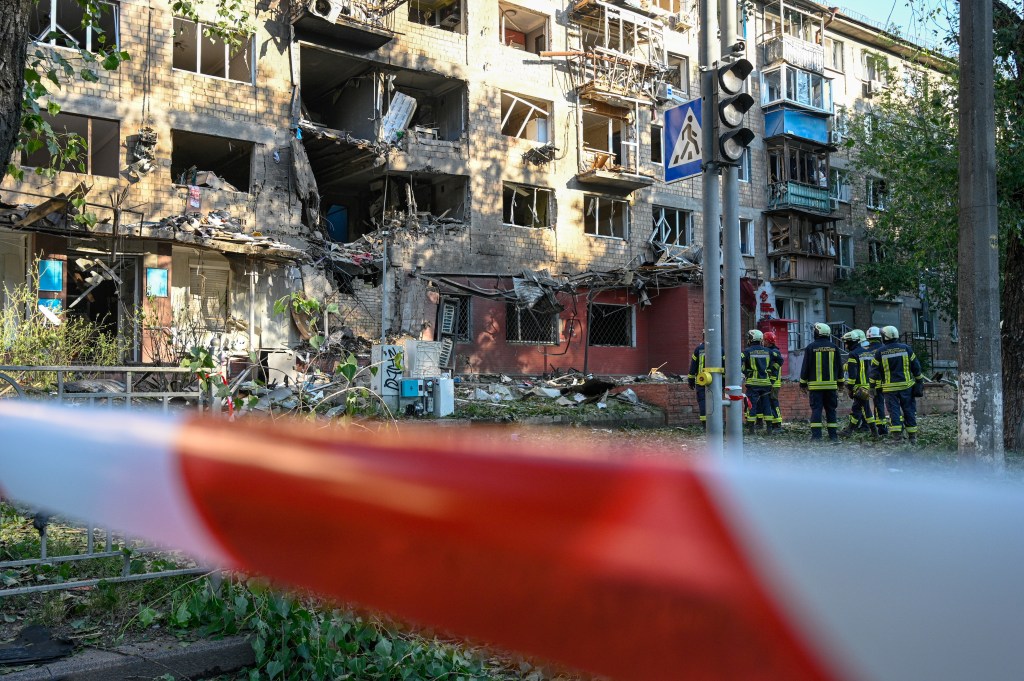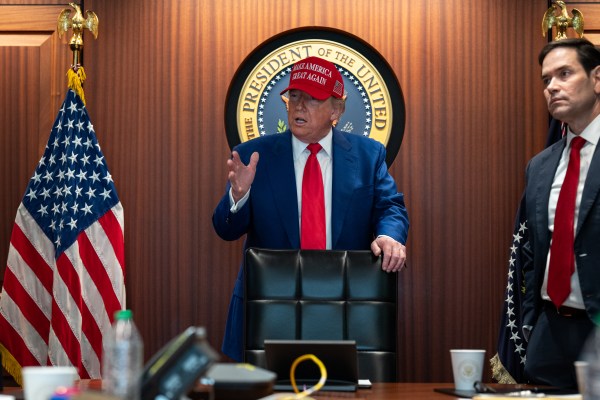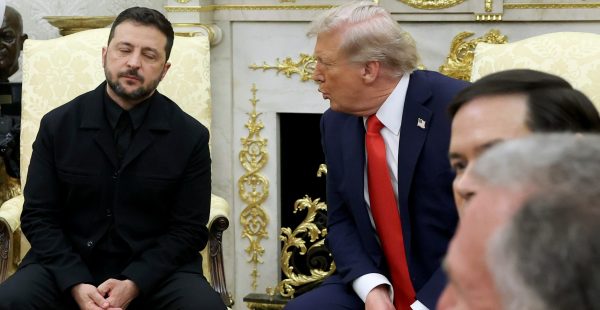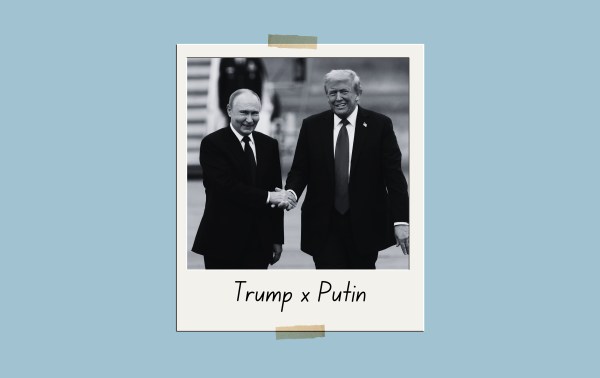The Pentagon’s decision to halt delivery of promised military assistance to Ukraine, announced last week, could not have come at a worse time. Ukraine faces the most intense aerial bombardment by Russia since the full-scale war began in February 2022, and it is in desperate need of missile defense systems that only the United States can provide. The urgency is heightened by the signal that the cutoff sends to the Kremlin: that it can win a war of attrition if the United States progressively abandons the military defense of Ukraine.
On Monday, however, President Donald Trump ordered the Pentagon to reverse its decision. “At President Trump’s direction, the Department of Defense will send additional defensive weapons to Ukraine to ensure the Ukrainians can defend themselves while we work to secure a lasting peace,” the Pentagon said later Monday night.
This reversal followed two phone calls by Trump late last week, the first with Russian leader Vladimir Putin and the second with Ukrainian President Volodymyr Zelensky. Trump himself said he was “very disappointed” with his call with Putin, and in the hours and days since that call, Russia has launched the most extensive drone and missile attack of the war against Ukrainian civilian targets, killing and injuring hundreds. The call with Zelensky the day after the call with Putin, by comparison, was “the best conversation in all this time,” according to Zelensky.
The Wall Street Journal reported that Trump told Zelensky in their phone call last Friday that he wasn’t responsible for the stop in weapons shipments to Kyiv. On Monday evening, during a meeting with Israeli Prime Minister Benjamin Netanyahu, Trump said regarding sending Ukraine more weapons, “We have to, they have to be able to defend themselves. They’re getting hit very hard. … We’re gonna have to send more weapons.”
None of this would have happened were it not for the Pentagon’s decision to halt delivery of weapons, many of which were waiting to cross the border from Poland. According to Politico, which broke the initial story about the Pentagon’s decision, Elbridge Colby, the undersecretary for policy at the Defense Department, decided to halt the shipments of artillery rounds, air defense missiles, and precision munitions, ostensibly because U.S. stockpiles were running low. Colby, it should be noted, has been an outspoken critic of assistance to Ukraine since well before he joined the administration. Moreover, the decision came in the face of analysis by the Joint Staff that contradicted the argument that the munitions in question were needed elsewhere, and Pentagon spokesman Sean Parnell has said the Pentagon has all the munitions it needs to carry out its assigned missions, undercutting Colby’s alleged argument.
The Pentagon decision also reflects an unprecedented process, wherein the undersecretary for policy appears to have made a decision on the sufficiency of munitions inventories, usurping the role of the chairman and vice chairman of the Joint Chiefs of Staff and the secretaries of the military services. They are charged by Title 10 of the U.S. code with manning, training, and equipping the U.S. armed forces, not the undersecretary.
Overall, the Pentagon’s decision to halt aid undermined President Trump’s announced determination to negotiate an end to the war and condemned Ukrainian civilians to suffer under an accelerating reign of terror from Russia’s brutal bombing campaign against noncombatant targets. The stop-and-start approach to providing assistance to Ukraine is demoralizing to Ukrainians on the front lines and emboldens those in the Kremlin who think they can outlast Western support for Ukraine.
The Europeans, who apparently were caught off guard by the Pentagon decision—as were the Ukrainians—have significantly stepped up their military assistance to Ukraine over the past year and especially since January 20, but they cannot substitute for what the American-made Patriot missiles are capable of doing: shooting down incoming Russian missiles. The Kremlin, by contrast, welcomed the U.S. decision. “The less weaponry is supplied to Ukraine, the sooner the [invasion] will end,” spokesman Dmitry Peskov told reporters.
The funds for these and other weapons—$61 billion worth—were approved by Congress last year, but the Biden administration took too long to deliver what Ukraine has needed. Throughout Russia’s full-scale invasion of Ukraine, the previous administration dragged its feet on accepting Ukrainian requests for weapons systems and then delivered too late to make a difference on the battlefield. A faster decision-making process in Washington over the past three years would have put Ukraine in a much stronger position today.
As it is, Ukraine has performed heroically and impressively, regaining more than 50 percent of its territory that Russia seized in the early stages in 2022, virtually crippling Russia’s Black Sea Fleet, launching an incursion into Russia’s Kursk territory, hitting military targets deep inside Russian territory, and inflicting more than a million casualties on Russian forces. The Ukrainians, out of necessity and inventiveness, have become self-sufficient when it comes to production of drones, changing the nature of warfare to a considerable degree in the process.
Imagine what the Ukrainians could have accomplished had we not tied their hands behind their back, denying and delaying their numerous weapons requests.
The Trump administration continued the weapons flow into Ukraine after it came into office, albeit with a short interruption in early March following the infamous Oval Office meeting between Zelensky and Trump and Vice President J.D. Vance. The resumption of the assistance has been important both militarily and from a morale standpoint, demonstrating to the Ukrainian side that the change in American administrations would not lead to a change in support for Ukraine. It also sent a critical signal to Moscow that despite the Kremlin’s huffing and puffing and wishful thinking, the United States would remain a supporter of Ukrainian security.
That support reflects the attitudes of the majority of the American people. According to a recent survey by the Ronald Reagan Institute, 73 percent of those polled say that the war between Russia and Ukraine “matters to the security and prosperity of the United States, with no differences across party lines. Most Americans (58%) want Ukraine to win the war, while only 7% say they would prefer a Russian victory.”
That sentiment is reflected in Congress as well, where more than 80 senators back legislation that imposes punishing sanctions on Russia and massive tariffs on countries that import Russian energy, a key revenue source for Russia’s war efforts.
Much of this support comes from Americans who are disgusted by the relentless and massive Russian bombing campaigns targeting Ukrainian civilians. Russian forces, after all, deliberately aim at civilian areas to try to instill as much fear as possible in the population; Ukraine, by contrast, largely limits its strikes to military targets in Russia.
Zelensky has shown a readiness to agree on a ceasefire pushed by the Trump administration, albeit without agreeing to Russian demands for recognition of territory illegally occupied by Russia, a change in government in Kyiv, or permanent neutrality. Putin, on the other hand, has shown zero interest in ending the fighting. Following the phone call between Trump and Putin, Yuri Ushakov, Putin’s foreign policy adviser, told reporters that Putin said Russia “will not back down” from its war aims. On Monday, Russian Foreign Minister Sergei Lavrov repeated Russia’s opposition to ending the war in an interview to Hungarian outlet Magyar Nemzet. Lavrov claimed that a settlement to the war must eliminate the “root causes” of the war—NATO’s expansion and Ukraine’s alleged discrimination against Russian speakers.
It is time for the administration, together with its European allies, to impose tougher sanctions on Russia and seize the $300 billion in frozen Russian assets left in Western financial institutions and make those funds available to Ukraine. That, together with continued military assistance, offers the best way to end the war.
After meeting with Zelensky at the recent NATO summit in The Hague, Trump said of Ukraine, “They do want to have the anti-missile missiles, as they call them the Patriots, and we’re going to see if we can make some available.” He added that the United States is supplying weapons to Israel and that “you know, they’re very hard to get. We need them, too.”
There is no question that the United States needs to ramp up its military production to address needs around the world. Our stockpiles do need to be replenished, especially as we face challenges in the Middle East and from China. Indeed, the National Defense Strategy Commission, co-chaired by one of the authors of this piece, called for precisely this in its report to Congress last year. But what is needed in Ukraine is not necessarily what Taiwan would need to fend off a Chinese invasion. There likely is more overlap between Ukraine’s needs and what U.S. forces require in the Middle East, in particular missile defense systems. But the war in Ukraine is a hot one, and Ukraine needs help yesterday, not next year.
Finally, it is not even clear that cutting off the Ukrainians from further U.S. military assistance strengthens deterrence of Chinese Communist Party aggression in the Indo-Pacific. On the contrary, demonstrations of American inconstancy in the face of continued Russian aggression only feed Beijing’s sense that time is on its side too. China has also indicated it’s interested in seeing the Russian war against Ukraine continue, to distract the West from China’s activity. Helping Ukraine against Russia will help deter any Chinese designs toward Taiwan.
Missile defense is not the only thing Ukraine needs from the United States. It’s vital for Ukraine to remain on offense to drive Russian forces further back. As analyst Shankar Narayan notes, “If Europe wants to end this war on its own terms, it won’t happen by intercepting missiles. It will happen by bending the battlefield—with fighter jets, long-range missiles, and everything Ukraine needs to take the fight deep into Russian positions.”
If the administration wants to end the war Russia launched against Ukraine, the best way to do so is to end the pattern of mixed signals and provide military assistance to Ukraine along with more, rather than fewer, sanctions. That might leave Putin with no choice but to sue for peace. Abandoning Ukraine, as the Pentagon seemed ready to do, would prolong the killing and the war and would seem to run against the stated position of the president. The stakes are enormous for Ukraine and the free world—and the U.S. role in supporting both.









Please note that we at The Dispatch hold ourselves, our work, and our commenters to a higher standard than other places on the internet. We welcome comments that foster genuine debate or discussion—including comments critical of us or our work—but responses that include ad hominem attacks on fellow Dispatch members or are intended to stoke fear and anger may be moderated.
With your membership, you only have the ability to comment on The Morning Dispatch articles. Consider upgrading to join the conversation everywhere.